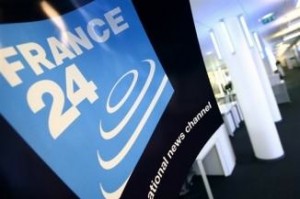 French international broadcaster Radio France International (RFI), its Arabic language subsidiary Monte Carlo Doualiya, and l’Audiovisuel extérieur de la France (AEF) have finally endorsed its merger with the France 24 news channel.
French international broadcaster Radio France International (RFI), its Arabic language subsidiary Monte Carlo Doualiya, and l’Audiovisuel extérieur de la France (AEF) have finally endorsed its merger with the France 24 news channel.
The merger will now go through, despite opposition from journalists and unions at France 24 and RFI. François Hollande, the socialist candidate for the French presidency, also signed a petition against the merger of RFI-France 24.
In a statement, the AEF stressed that the merger “allows the creation of a French broadcasting group of international dimensions.”
AEF is the holding company of France 24 and is fully owned by the French state.
In a statement, AEF CEO, Alain de Pouzilhac, said: “With RFI, France 24 and Monte Carlo Doualiya now in a single firm combining their strengths, their talents and their expertise we can now broadcast the values of France with a single eye on all modes of distribution.”
Although the merger is now official, unions are believed to continue to fight the decision.
Broadband TV Views. When the French state established the international news channel France 24 in order to fight Anglo-Saxon dominance of the international news media, people already raised eyebrows that a separate organisation was set up.
The French state was already active promoting its culture and language through the means of Radio France International (RFI), RFO (the state broadcaster for overseas departments and territories), Canal France International (a subsidiary of state broadcaster France Télévisions) and the involvement of France Télévisions in the international operations of TV5.
Although RFI is radio and France 24 television, it makes perfect sense to join the operations, especially in times of cutbacks of public service broadcasters around Europe. But its workers seem to have trouble facing today’s realities.
As an outsider, we can only look in amazement how the French state tries to control radio and TV. After World War Two, the French state even took active part through its holding company SOFIRAD in the private radio stations that were broadcasting from across the border into France, such as RMC (Monte Carlo), Europe 1, Sud Radio and Radio Andorre.
Of all these foreign broadcasters, only RTL from Luxembourg remained independent from the French state – at least financially.